How to Start Trading Cryptocurrencies
If you're curious about how to start trading cryptocurrencies, select a reliable exchange, fund your account, educate yourself, and manage risks.
How to Start Trading Cryptocurrencies?
Here's a beginner-friendly guide to help you begin your journey into the exciting realm of digital assets.
1Choose the right exchange
The initial stage in cryptocurrency trading involves selecting a dependable exchange platform or crypto broker. Popular options include Coinbase, Binance, and Kraken. Make sure to research each exchange's features, security measures, fees, and available cryptocurrencies before making your decision.
2Create an account and verify your identity
Register for an account and finish the verification procedure. This typically involves providing personal information and verifying your identity to comply with Know Your Customer (KYC) and Anti-Money Laundering (AML) regulations. Verifying your identity enhances the security of your account and allows you to access advanced trading features.
3Fund your account
After your account is verified, it's time to fund it with fiat currency or cryptocurrencies. Most exchanges support multiple payment methods, such as bank transfers, credit/debit cards, and cryptocurrency deposits. Choose the option that suits you best and deposit funds into your trading account.
4Educate yourself
Take the time to educate yourself about cryptocurrencies and trading strategies. Familiarize yourself with fundamental concepts like blockchain technology, market analysis, and risk management. Moreover, contemplate becoming a member of cryptocurrency communities and forums to glean insights from seasoned traders and keep abreast of market trends.
5Start trading
With your account funded and knowledge acquired, you're ready to start trading cryptocurrencies. Begin by placing small, manageable trades to gain experience and test your strategies. Keep an eye on market trends, news developments, and price fluctuations to make informed trading decisions.
6Manage risks
Invest only what you're willing to lose, and diversify your portfolio to mitigate risk. Set stop-loss orders to limit potential losses, and avoid making impulsive decisions based on emotions. By adopting a prudent risk management strategy, you can protect your capital and mitigate potential losses.
Final thoughts
Starting trading cryptocurrencies is an exciting journey that requires diligence, patience, and continuous learning. By choosing the right exchange, educating yourself, and managing risks effectively, you can navigate the cryptocurrency markets with confidence. Remember to stay informed, stay disciplined, and stay focused on your long-term goals as you embark on your trading adventure.
The article is crafted by Johnathan Maverick, a seasoned financial journalist and editor at Traders Union.
Financial Markets Expert
Glossary for novice traders
-
1
Bitcoin
Bitcoin is a decentralized digital cryptocurrency that was created in 2009 by an anonymous individual or group using the pseudonym Satoshi Nakamoto. It operates on a technology called blockchain, which is a distributed ledger that records all transactions across a network of computers.
-
2
Cryptocurrency
Cryptocurrency is a type of digital or virtual currency that relies on cryptography for security. Unlike traditional currencies issued by governments (fiat currencies), cryptocurrencies operate on decentralized networks, typically based on blockchain technology.
-
3
Risk Management
Risk management is a risk management model that involves controlling potential losses while maximizing profits. The main risk management tools are stop loss, take profit, calculation of position volume taking into account leverage and pip value.
-
4
Forex Trading
Forex trading, short for foreign exchange trading, is the practice of buying and selling currencies in the global foreign exchange market with the aim of profiting from fluctuations in exchange rates. Traders speculate on whether one currency will rise or fall in value relative to another currency and make trading decisions accordingly. However, beware that trading carries risks, and you can lose your whole capital.
Team that worked on the article
Johnathan M. is a U.S.-based writer and investor, a contributor to the Traders Union website. His two primary areas of expertise include finance and investing (specifically, forex and commodity trading) and religion/spirituality/meditation.
His experience includes writing articles for Investopedia.com, being the head writer for the Steve Pomeranz Show, a personal finance radio program on NPR. Johnathan is also an active currency (forex) trader, with over 20 years of investing experience.









